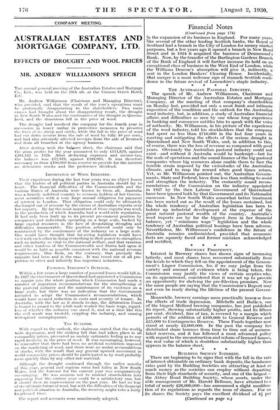THE AUSTRALIAN PASTORAL INDUSTRY.
The speech of Mr. Andrew Williamson, Chairman and Managing Director of the Australian Estates and Mortgage Company, at the meeting of that company's shareholders on Monday last, provided not only a most frank and intimate exposition of the condition and the outlook for the Australian wool industry, but, in addition, a study of Australian financial affairs and difficulties as seen by one whose long experience in banking and commerce entitles him to speak with the voice of authority. Mr. Williamson, in his picture of the experience of the wool industry, told his stockholders that the company had spent no less than £716,000 in the last four years in meeting and mitigating the effects of the serious drought in Queensland and New South Wales, and, in addition to this, of course, there was the loss of revenue as compared with gond years. Obviously the Australian pastoral industry could not exist—and without it Australia would be bankrupt—but for the scale of operations and the sound finance of the big pastoral companies whose big resources alone enable them to face the terrible strain imposed by the vicissitudes of the Australian climate, and to reap the reward when good times return. Yet, as Mr. Williamson pointed out, the Australian Govern- ments, State and Federal, have done less than nothing to assist and strengthen the industry. The eminently sound recom- mendations of the Commission on the industry appointed in 1927 by the then Labour Government of Queensland have been ignored both by that Government and its Nationalist successor. In New South Wales somewhat better treatment has been meted out as the result of the losses sustained, but the whole tendency of Australian legislation has been to bolster up industrial development at the expense of the great natural pastoral wealth of the country. Australia's wool imports are by far the biggest item in her financial balance, yet " minimum wage " legislation and the whole tendency of Australian political leanings have been adverse. Nevertheless, Mr. Williamson's confidence in the future of Australia remains undiminished, provided that economic facts are squarely faced and former mistakes acknowledged and rectified.
* * * *
































 Previous page
Previous page